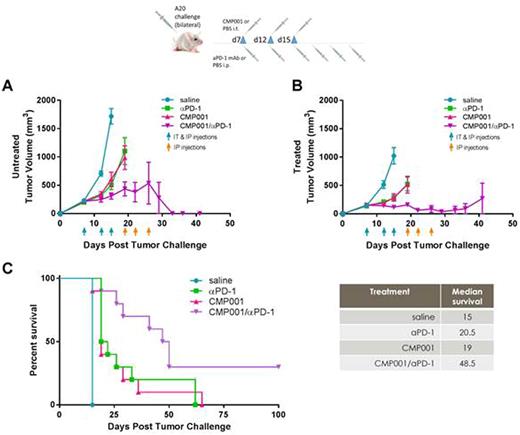Abstract
Checkpoint blockade of immune inhibitory pathways is an exciting therapeutic approach for the treatment of a variety of cancers and has become a standard of care for melanoma and other malignancies. Preliminary results suggest anti-PD-1 has modest single agent activity in patients with non-Hodgkin lymphomas, however there remains considerable room for treatment optimization and improvement through the use of unique immunotherapeutic combinations.
We explored one such combination of PD-1 checkpoint blockade and CMP-001, a virus-like particle (VLP) containing a novel immunostimulatory CpG oligodeoxynucleotide (ODN) TLR9 agonist. Clinical grade CMP-001 is available and has been evaluated in over 700 subjects in non-cancer trials. In both preclinical and clinical studies, CMP-001 stimulates a strong and prolonged local Th1 cytokine response designed to enhance antigen presentation. Thus, with intratumoral injection, CMP-001 could augment the development of a tumor-specific T cell response that can be maintained by anti-PD-1 therapy.
Syngeneic, immunocompetent mice were inoculated on both the left and right flanks subcutaneously with lymphoma (either A20 B cell lymphoma or E.G7-OVA T cell lymphoma). Anti-PD-1, or isotype control, was delivered intraperitoneally (i.p.) starting one week after tumor challenge and continued twice weekly. CMP-001, or saline control, was delivered intratumorally (i.t.) into the tumor on one flank also starting one week after tumor challenge for a total of 3 doses. Tumor growth and survival was followed. This experimental design allowed us to assess the local (treated tumor) and abscopal (untreated tumor) effect of therapy in two different lymphoma models.
Intratumoral CMP-001 enhanced survival, and reduced tumor growth of both the treated and untreated tumors in the A20 lymphoma model. Each of these effects was enhanced with the addition of anti-PD-1 therapy (Figure 1). The anti-tumor effect on both the treated and untreated tumor was lost with depletion of either CD4 or CD8+ T cells demonstrating both cell populations contributed to the therapeutic effect. In the E.G7 model, CMP-001 treatment reduced growth of the local tumor - an effect that was modestly enhanced by anti-PD-1 therapy and dependent on CD8+ T cells. There was no significant response to therapy observed in the untreated E.G7 tumor, perhaps due to the rapid growth of the tumor before an abscopal immune response could develop.
We conclude the combination of systemic anti-PD-1 and intratumoral injection of CMP-001 can enhance development of a systemic anti-tumor T cell response and is a promising immunotherapy combination worthy of clinical evaluation. A Phase 1b clinical trial of the combination of anti-PD-1 and CMP-001 is underway in advanced melanoma, and a Phase 1 clinical trial of the same combination is planned in lymphoma, based in part on these results.
Krieg:Checkmate Pharmaceuticals: Employment, Equity Ownership, Membership on an entity's Board of Directors or advisory committees. Weiner:Checkmate Pharmaceuticals: Consultancy, Research Funding.
Author notes
Asterisk with author names denotes non-ASH members.


